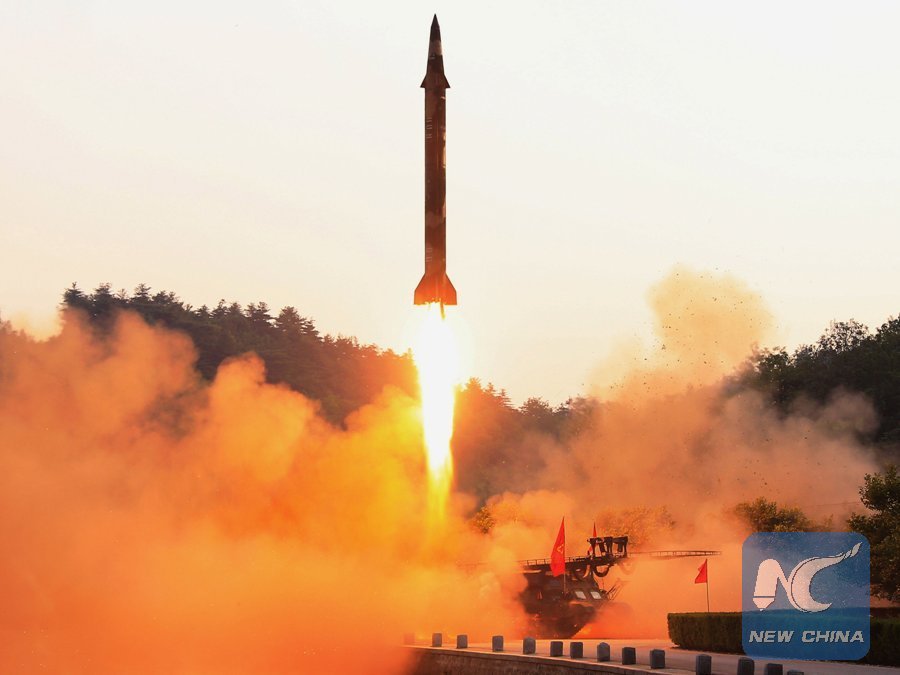
Photo provided by Korean Central News Agency (KCNA) on May 30, 2017 shows the test-firing of a ballistic missile by the Democratic People's Republic of Korea. (Xinhua/KCNA)
by Xinhua writers Liu Chen, Guo Yina
WASHINGTON, Aug. 9 (Xinhua) -- It is important to have a high-level dialogue as soon as possible between the United States and the Democratic People's Republic of Korea (DPRK), former U.S. Defense Minister William Perry has said amid escalating tensions on the Korean Peninsula nuclear issue.
It is truly vital for the two countries to "conduct a serious negotiation aimed at bringing peace to the peninsula and bringing a non-nuclear peninsula into being as soon as possible," said Perry in an interview with Xinhua earlier this week.
Perry's remarks came after the United Nations (UN) Security Council unanimously passed a resolution Saturday slapping new economic sanctions on the DPRK over its ballistic missile and nuclear programs.
"Sanctions in theory can be effective, but in practice usually are not," said Perry, who was the Pentagon chief in 1994-1997 under then President Bill Clinton.
The Security Council also seeks resumption of the six-party talks aimed at verifiable denuclearization of the Korean Peninsula.
"The six-party talks has a great merit involving all of the countries that are most concerned about the issue," said Perry, 89, who visited the DPRK as Clinton's special envoy in 1999.
"We need partnership to put together an effective, really effective diplomacy," said Perry.
Perry also noticed that a "right negotiating strategy" is needed in the six-party talks, which gathers China, the DPRK, Japan, Russia, South Korea and the United States.
In the interview, Perry expressed opposition to Washington's ramping up pressure on China to curb Pyongyang's ballistic missile and nuclear programs.
It is not enough for President Donald Trump to say "China, it is your problem, you solve it," Perry said.
In efforts to resume peaceful talks, Beijing has proposed a "double suspension" proposal that the DPRK should suspend its ballistic missile and nuclear activities while the United States and South Korea suspend large-scale joint military drills.
During the interview, Perry called on the DPRK to freeze its nuclear tests and long-range missile launches. "That would at least keep the nuclear dangers from getting worse," he said.
Meanwhile, Perry noted that it is important for the concerned parties to understand the DPRK's priority concern.
As long as the DPRK feels threatened by the United States, it will feel obliged to move to nuclear weapons, Perry said. "The goal is giving each side the reasonable assurance that their security is not threatened," he said.
"There's no reason for the United States to even have troops" in South Korea if the DPRK would be no longer seen as a threat by South Korea, he added.
The former U.S. defense chief also said South Korea's decision on deploying the advanced U.S. anti-missile system of Terminal High Altitude Area Defense (THAAD) will not solve the problem.
In his opinion, "it just gives the South Korean people some reason to feel more comfortable that they could be defended."
Both China and Russia have voiced strong opposition to the THAAD deployment, pointing out that it exceeds South Korea's security needs, disrupts the regional strategic balance and jeopardizes the security interests of other countries in the region.
Referring to the Trump administration, Perry said the White House has kept sending "mixed signals."
U.S. Secretary of State Rex Tillerson said earlier this month that Washington is willing to talk to Pyongyang should it halt ballistic missile test launches. On Tuesday, Trump vowed to counter threats from Pyongyang with "fire and fury."
Hours after Trump's tough words, Tillerson said the developments do not suggest the United States is moving closer to a military option.
"I think we did not have an effective strategy," said Perry.
He also criticized the administrations of former Presidents George W. Bush and Barack Obama for adopting a "policy of strategic patience."
"It was believing something was going to happen without having a way of making it happen ... Hope is not a strategy," he said.
As a longtime advocate of a nuclear-free world, Perry called on the concerned parties of the Korean Peninsula issue to "find a way of dealing with the problem without military action."
In his opinion, "even a small military conflict is a danger because it's all too easy to escalate and become another Korean War."

